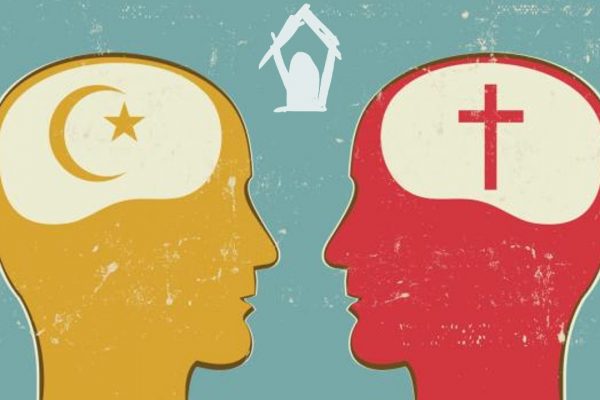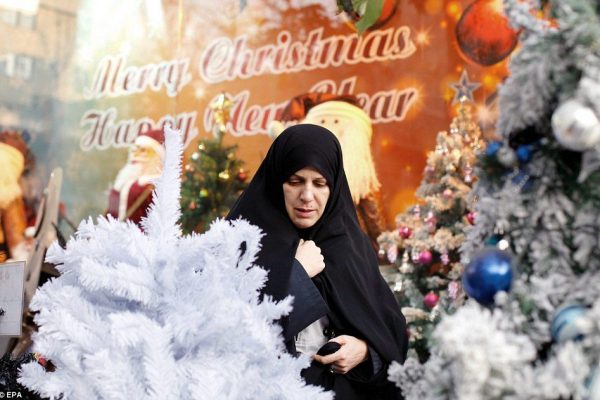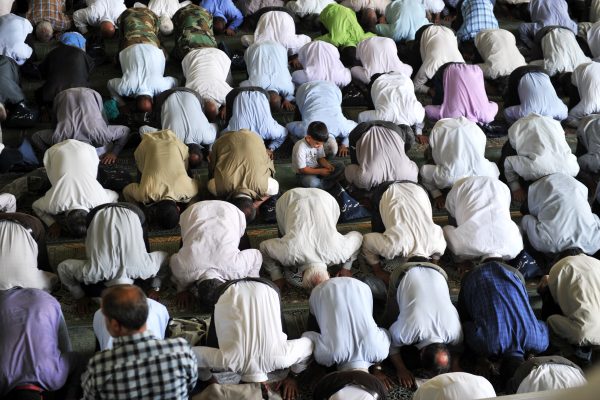“And when your Lord said to the angels, ‘I am going to place a vicegerent on the earth,’ they said, ‘Will You place on it one who will spread corruption and shed blood, while we glorify You through praise and call You holy?’ He said, ‘Truly I know what you know not.’” (Quran 2:30)
Misanthropy, or “the dislike or hatred of humanity”, seems to be pervasive and commonplace. Too often we despise one another because of politics, class, race, gender, sexuality, religion, nationality and a host of other identities. The cacophony of much of what passes for public discourse—from cable news to social media—has only increased the discord and division between us.
The proliferation of modern forms of military technology in the twentieth and now twenty-first centuries, including nuclear weapons and drones, has enabled us to destroy entire civilizations at a distance. Even climate change seems to have alienated us from our humanity. If human behavior is the primary cause of global warming, then the solution must be to reduce our birth rate as a species.
However daunting these and other challenges may be, it seems to me that to face them we first need to recover a vision of our sacred humanity. In order to defend and care for each other and our planet, we must witness the light of God in our own heart and the hearts of our neighbors.
The Abrahamic religions seem to posit a strictly transcendent God, an almost deistic deity that is removed from the world and only intervenes at special moments in history: the burning bush, the birth of Christ, and the revelation of the Quran. The sacred then becomes confined to our theologies, laws, icons, holy books, and memories.
Our preconceived idea of God becomes an inanimate idol, instead of the living God that appears in every soul and vista. Revelation becomes a box that we place God in, distrustful and wary of seeing divinity outside of these confines. For how can man-made laws compare to the laws of Moses, Muhammad, or Manu? Is it not blasphemous to compare another human being—a saint, a beloved or a friend—to the exalted nature of Jesus or the prophets? And what modern work can we mention in the same breath as the Torah, the Psalms, the Gospel, or the Quran?
It is true that, for the faithful, God sends down divine revelations that are unique. These sacred forms are in many ways incomparable and paradigmatic. They have inspired believers throughout the centuries and have even influenced the secular formation of modern and postmodern philosophy, art, science, ethics and civilization in general. However, I would argue that revelation is something more. It is a transhistorical event, a rupture between heaven and earth, that occurs not only in the past, but also the present, not only in the soul of a prophet, but to all who orient themselves towards the Divine with sincerity.
The Quran cautions us not to believe that the accounts of the prophets are mere stories, tales, or fables. The apparent meaning is that these accounts really happened, whether in the material world or the imaginal world, the place of dreams and visions. Another meaning is to know that we too face similar social, ethical, psychological, and spiritual struggles that the prophets faced. We each have a Moses and a Pharaoh in our soul. We each can choose between truth and falsehood, justice and tyranny, peace and war, humility and pride, and love and hatred. The hero’s journey is not something in the past. Our holy books and figures are, when taken at their best, mirrors that reveal ourselves and the world around us.
In our hearts, we all resemble the prophets, their goodwill towards others and their solitary devotion to God. Indeed, the light of the Divine is our true nature, but often veiled by forgetfulness and choices that sometimes obscure that nature. The quest is to rediscover the innate light within us, whether understood as our primordial nature (fitrah), intellect (‘aql), spirit (ruh), heart (qalb), the logos or word (kalim), the personified luminosity of a given prophet or saint, or God as such.
As Jesus reminds us in the Gospel, “The kingdom of God in within you.” (Luke 17:21) The kingdom of God includes the prophets, their adversaries, angels, demons, paradise, hell, humanity, creation and—at the center of our inner kingdom—the Divine Itself. Certain Muslim mystics quote the Prophet Muhammad as saying, “The heart of the faithful is the throne of the Compassionate (al-Rahman).”
However, Jesus also says in the non-canonical Gospel of Thomas, “The kingdom of God is both inside you and manifest to the outer eye.” (Logion 3) The kingdom also manifests outwardly as the neighbor and the natural world. Religion or spirituality solely focused on God within can become egotistical and self-serving, an aloof esoterism for the elite. We must also recognize that other human beings and the world around us are theophanies or disclosures of the Divine. God is both “the Inward” (al-Batin) and “the Outward” (al-Zahir).
It seems to me that the practical implications of this realization are profound. We can begin to behold other people and all creatures as sacred beings, created in the image of God. An act of violence done to the neighbor is an act of violence against God. This vision of human sanctity was confirmed by Jesus when he said, “…Inasmuch as you have done it unto one of the least of these my brethren, you have done it unto me.” (Matthew 25:40)
Similarly, a sacred saying (hadith qudsi) of God uttered by the Prophet Muhammad affirms that the Divine is with humanity: “…And when I love him, I am his ear with which he hears, his eye with which he sees, his hand with which he grasps, and his foot with which he walks.” Likewise, the Bhagavad Gita states, “He whose heart is steadfastly engaged in spiritual practice looks everywhere with the eyes of equality, seeing the Self in all beings and all beings in the Self.”
Some may respond that the unveiling of our unity with God, or annihilation (fana’) and subsistence (baqa’) in the language of the Sufis, is only realized by the prophets and rare saints. It is true that the divine names (e.g. light, truth, peace, justice, and mercy) manifest more fully through God’s chosen who are tested and persevere on the path of service, love and gnosis. However, all human beings, indeed all creatures, manifest a measure of the divine names. Further, all of us have the potential to strive towards realization and radiate the light that is hidden within. We must only begin to see ourselves and those around us as sacred beings, connected and embraced by the One who created us.
What can we do to discover God amongst humanity? Study the lives and teachings of the prophets—their spiritual and social visions—and imagine them with us. Search for a saint or a true friend who can show us our inner light in the mirror of their words, actions and countenance. Find and sit with someone who gazes upon you the way that Jesus looked upon his disciples, strangers, the poor, the outcasts and even his apparent enemies. That loving glance will heal because in it is the recognition that we too have a Christ-like nature. Even if we or others have tried to conceal or extinguish the light within our entire lives, we have the choice and power—with the grace of God—to manifest it in the present.
Establish a daily pattern of prayer, contemplation or meditation to create space within for the presence of the sacred to manifest more fully in our lives. Practice serving others with respect and reverence, keeping in mind that each person is a unique image, name or face of God. Ideally, we can then combine prayer and service through invoking the Divine before serving our family, friends, those in need in our community and others in distant lands. We should also take care to listen to others to honor their voices, stories and needs. It may be that they have answers that we are searching for, that they can offer us help and inspiration.
We live in a world where men, women and children are bombed and dismembered for land, resources and power. We live in a world where far too many politicians, preachers and pundits appropriate religion and the sacred—taking the name of God in vain—to demonize and harm the most vulnerable among us. We live in a world that is dying, a world experiencing an environmental apocalypse. The angelic complaint against humanity may seem justified to many, but it risks devolving into diabolical misanthropy. For when the angels were instructed to bow before Adam, it was only Satan who refused. And it is only our own pride that keeps us from seeing and honoring the light of God in each and every one of us.
It is pride and ignorance that keeps us from acknowledging our sacred humanity, with God or the Sacred at our center and periphery, our heart and limbs. Human sanctity is the basis for human rights. Indeed, it is our failure to see God in one another—and also animals, birds, insects, trees, fish, oceans, the heavens and the earth—that enables us to harm the apparent other. To overcome the many injustices in the world and those brought forth by our own souls, we must know that truth, goodness and beauty are woven into the very fabric of our being. We must see that we each have the potential to change and grow, to more fully manifest the divine light within and to recognize it in others.
“Speak words of hope…Be human in this most inhuman of ages; guard the image of man for it is the image of God.” -Thomas Merton
Sources
- Talal Asad, Secular Translations: Nation-State, Modern Self, and Calculative Reason (New York: Columbia University Press, 2018).
- Angelus Silesius observed, “Christ could be born a thousand times in Galilee—but all in vain until he is born in me.” The Book of Angelus Silesius, trans. Frederick Franck (Santa Fe, NM: Bear & Co., 1985), 107. Similarly, Ibn ‘Arabi remarked that, “The Quran is perpetually new for all who recite it…” Michel Chodkiewicz, An Ocean Without Shore: Ibn ‘Arabi, the Book, and the Law, trans. David Streight (Albany, NY: State University of New York Press, 1993), 25.
- Henry Corbin, Mundus Imaginalis or the Imaginary and the Imaginal, trans. Ruth Horine (Ipswich: Golgonooza Press, 1976).
- James Winston Morris, “Listening for God: Prayer and the Heart in the Futuhat,” Journal of the Muhyiddin Ibn ‘Arabi Society, vol. 13 (1993), 23. This saying may be apocryphal, but God states in the Quran, “We are nearer to him [the human being] than his jugular vein.” (50:16)
- Samuel Zinner, The Gospel of Thomas: In the Light of Early Jewish, Christian and Islamic Esoteric Trajectories (London: The Matheson Trust, 2011), 291.
- William A. Graham, Divine Word and Prophetic Word in Early Islam: A Reconsideration of the Sources with Special Reference to the Divine Sayings or Hadith Qudsi (The Hague: Mouton & Co., 1977), 173; and Sahih al-Bukhari, Kitab al-riqaq, bab al-tawadu‘i, hadith 2.
- Srimad-Bhagavad-Gita, trans. Swami Paramananda (Boston: The Vedanta Centre, 1913), 54. See also, Ananda K. Coomaraswamy, “On the One and Only Transmigrant,” Journal of the American Oriental Society, no. 3 (1944), 19-43.
- Gene Knudsen Hoffman, Compassionate Listening, edited by Anthony Manousos (Portland: Western Friend, 2013).
- Thomas Merton, Raids on the Unspeakable (New York: New Directions Publishing, 1964), 6.









